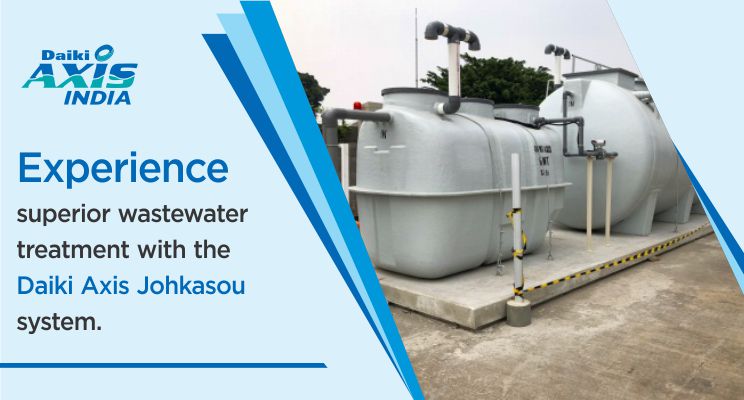The Johkasou System represents a decentralized approach to sewage treatment, bringing treatment processes closer to the point of origin. It eliminates the need for extensive centralized treatment plants, significantly reducing the environmental footprint associated with sewage transportation and treatment.
Wastewater management is a critical aspect of modern infrastructure, with implications for environmental health, resource conservation, and public well-being. At the forefront of innovative sewage treatment solutions is the Johkasou System, developed by Daiki Axis Japan and embraced worldwide, including in India by Daiki Axis India.
India boasts a rich array of waterbodies, from rivers like the Ganges and Yamuna to lakes and coastal areas. However, these water bodies face significant pollution challenges due to industrial discharge, untreated sewage, agricultural runoff, and plastic waste. The pollution of water bodies not only threatens aquatic ecosystems but also poses risks to human health, leading to waterborne diseases and environmental degradation.
Johkasou System
The Johkasou System represents a decentralized approach to sewage treatment, bringing treatment processes closer to the point of origin. It eliminates the need for extensive centralized treatment plants, significantly reducing the environmental footprint associated with sewage transportation and treatment.
Advantages and Benefits
- Decentralized Infrastructure: The decentralized nature of the Johkasou System offers numerous advantages, including reduced energy consumption, lower maintenance costs, and enhanced system resilience during peak usage periods.
- Cost-Efficiency: By treating wastewater at the source, the system reduces the need for costly infrastructure for sewage collection and transportation, resulting in overall cost savings.
- Versatility: The system’s adaptability allows it to handle both black water (from toilets) and grey water (from sinks, showers, and laundry), ensuring comprehensive treatment of domestic wastewater.
- Environmental Impact: Implementing the Johkasou System reduces pollution levels, preserves aquatic ecosystems, and safeguards public health by preventing the discharge of untreated sewage into water bodies.
- Resource Conservation: The system promotes water conservation through the reuse of treated wastewater for non-potable purposes, such as irrigation, industrial processes, or toilet flushing.
How Johkasou System Works
The Johkasou System follows a series of stages to treat wastewater effectively:
- Primary Treatment: Incoming wastewater undergoes primary treatment, where large solids and debris are removed through screening and sedimentation.
- Biological Treatment: Microorganisms break down organic matter in the wastewater, converting it into harmless byproducts such as carbon dioxide and water. This process occurs in aerobic and anaerobic chambers within the system.
- Filtration and Disinfection: After biological treatment, the wastewater undergoes filtration to remove remaining impurities. Disinfection methods, such as UV treatment or chlorination, are then applied to ensure the effluent is safe for discharge or reuse.
- Effluent Discharge or Reuse: The treated wastewater, now free from contaminants, can be safely discharged into the environment or utilized for non-potable purposes, contributing to resource conservation.
Daiki Axis Japan and Daiki Axis India
Daiki Axis India, as a subsidiary of Daiki Axis Japan, plays a crucial role in the global deployment and implementation of the Johkasou System. Daiki Axis Japan’s expertise in wastewater treatment technology, coupled with Daiki Axis India’s local market knowledge and implementation capabilities, has facilitated the successful adoption and deployment of the Johkasou System across various sectors and regions. This collaborative approach ensures that the system is tailored to meet specific needs and challenges, driving widespread adoption and impact.
FRP Units and Sustainability
The use of FRP units in the Johkasou System enhances sustainability by providing durable, corrosion-resistant, and long-lasting components. These units contribute to the system’s reliability, minimal maintenance requirements, and extended service life, reducing environmental impact and operational costs.
Black and Grey Water Treatment
The Johkasou System’s capability to treat blackwater and greywater ensures comprehensive wastewater treatment. Advanced processes effectively remove contaminants, pathogens, and pollutants, producing high-quality effluent suitable for safe discharge or reuse.
Environmental Impact
The implementation of the Johkasou System has far-reaching environmental benefits. By reducing pollution levels, conserving water resources, and promoting sustainable practices, the system contributes significantly to environmental sustainability and resilience.
Conclusion
The Johkasou System by Daiki Axis represents a transformative leap in wastewater treatment, combining advanced technology, environmental stewardship, and cost-effective solutions. As global communities strive for cleaner and more sustainable environments, technologies like the Johkasou System play a pivotal role in shaping a greener future and ensuring the well-being of future generations.
Contact us at https://daikiaxis.in/contact-us/
Read more relevant blogs here: https://daikiaxis.in/blog/
#Johkasou System #DaikiAxis #Johkasou #sewage #water #STP #DaikiSTP.
#PackagedSTP #JohkasouPrice #PackagedSewageTreatmentPlant #STPCompanies #STPPlant #SewageTreatmentPlantinDelhi #SewageTreatmentPlantinIndia #STPPlantManufactures #SewageTreatmentPlantManufacturesinIndia #johkasouSTP

